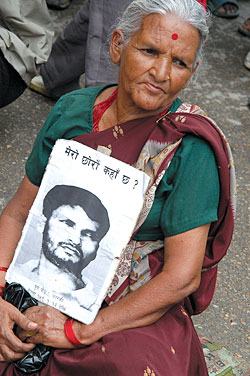 |
Unlike other wars, neither side won Nepal's conflict. Neither side lost, either. But the Nepali people lost. And they continue to suffer because the warring sides don't want to address the issues of transitional justice and war crimes.
Among the victims, the plight of those whose relatives had disappeared continues to linger. They live in limbo, they have been ignored and their tears have never dried.
Their patience is also wearing thin. Frustration is giving way to a sense of vengeance. This is not good news for a society which needs to heal from the years of war. There is no meaning in discussing justice and human rights in this chaotic environment, where perpetrators lead the transition, where victims do not feel secure to speak out, and remain excluded from the justice system.
Human rights violators from both sides remain in positions of power, and talk of justice. This denial of accountability has institutionalised violence and set the stage for a resurgence of conflict. Political leaders often justify their past actions saying the atrocities were the result of "unfortunate circumstances" and we are all victims of structural violence.
This line of thinking justifies enforced disappearance and the extra-judicial killings during the war. No one is ready to take responsibility or acknowledge the past injustice. The failed transitional justice environment has created disillusionment and hopelessness among the families of the disappeared. They feel marginalised and betrayed by the state. Words like "truth" and "reconciliation" don't carry any meaning anymore. Families of the disappeared were promised that the fate of their relatives would be made public in 60 days. They have waited 1,738 days.
Nepal's peace process is centered in Kathmandu and led by reluctant governments in the last five years. It has failed to build a comprehensive strategy to bring parties involved in conflict to a common platform so as to determine the whereabouts of ordinary victims in rural areas.
Victims' groups have been formed but these have, to date, been dominated by those created either by political parties in which only victims of one party to the conflict are represented, or by human rights agencies that seek to impose their understanding of the goals and in turn offer victims little agency.
As a result, the entire campaign has been fragmented and instrumentalised to serve the agenda of the few. The existing local victims' groups, who provide financial and psychological support to the victims must adopt a non-partisan approach and stand in a united platform to prevent themselves from being manipulated for vested interests.
The government, for its part, must first commit itself towards delivery of justice. It should respect and implement the past promises it has made to address plights of the victims and their families. The recommendations made by Supreme Court, the NHRC and the international community must be respected and the Government of Nepal should ratify the International Convention for the Protection of All Persons from Enforced Disappearance and recognize disappearances as against humanity. It must go beyond the easily accessible urban activists and consult as broadly as possible with victims and their families.
Rulers in Kathmandu have completely forgotten one of the most painful pages in our history. To them, it is just an 'episode' in the struggle for power at the top. Nepal has already paid heavily for the loss of over 1,350 lives and the price will be higher if such ignorance continues.
Ram Kumar Bhandari, whose father was disappeared in 2001, is a human rights activist and chair of the National Network of Families of Disappeared and Missing (NEFAD).
Read also:
Mistaken for peace, ANURAG ACHARYA
See also:
The politics of memory



